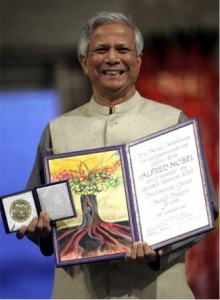by rahnuma ahmed
Dr. Muhammad Yunus, proud recipient of The Nobel Peace Prize, 2006, which was awarded jointly to Muhammad Yunus and Grameen Bank, which he founded, “for their efforts to create economic and social development from below.”

I had written earlier in this series that now, when I look back, it seems that the policy planners of the consortium government had almost arithmetically calculated that a ‘political vacuum’ resulting from minus-ing the two leaders, from dismantling the organisational structure of the two major political parties — would create the enabling conditions for redrawing the terrain of politics in Bangladesh (divorcing it further from the issue of national sovereignty) in a manner so as to serve, and further perpetuate, the interests represented by the western power bloc. Continue reading “Part V Military-installed caretaker govt, or a 'consortium' govt?”
